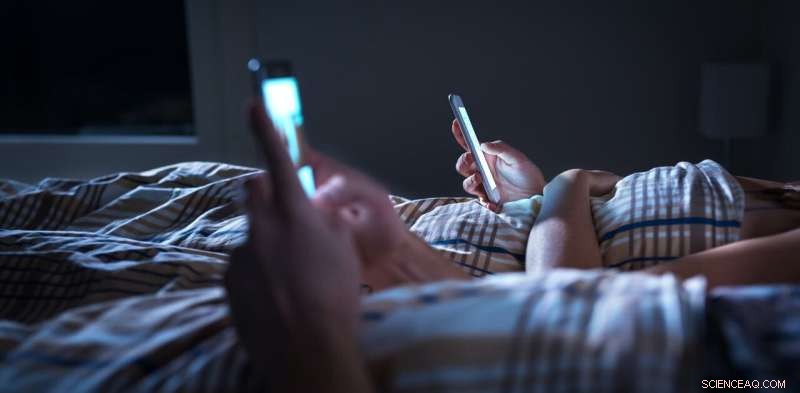Vil du slette dine sociale medier, men kan du ikke få dig selv til at gøre det? Her er nogle måder at tage det skridt på

Kredit:Shutterstock
I mere end et årti har vi været dybt fordybet i en kærlighedsaffære med sociale medier. Og tanken om at afslutte ting kan være smertefuld. Men som ethvert forhold, hvis sociale medier ikke længere gør dig glad – og hvis det er udmattende i stedet for sjovt at kurere din online-persona – er det måske tid til at sige farvel.
I slutningen af sidste år kom Meta (tidligere Facebook) under intens undersøgelse efter lækkede dokumenter afslørede, at virksomheden var fuldt ud klar over den negative indvirkning, dets produkter, især Instagram, kan have på brugernes mentale sundhed.
Meta gik direkte i skadekontrol. Men det så ud til, at ingen var særlig overrasket over nyheden - ikke engang teenagepiger, som Meta identificerede som mest udsatte. Bekræftede lækagen bare det, vi allerede havde mistanke om:at sociale medier har potentialet til at være meget mere skadelige end nyttige?
Hvordan blev vores engang ubekymrede forhold til sociale medier surt? Og måske vigtigst af alt, kan (eller skal) det reddes?
Ser de røde flag
Relationsrådgivere vil ofte bede urolige par om at tænke over, hvad der gjorde dem lykkelige i deres forhold. Sociale medier, selv om det er irriterende peccadilloes, har nogle forløsende funktioner.
Gennem pandemien er evnen til at forblive forbundet med mennesker, vi ikke kan se personligt, blevet utrolig værdifuld. Sociale medier kan også hjælpe folk med at finde deres stamme, især hvis folk i deres offline verden ikke deler deres værdier og overbevisninger.
Men hvis du ikke kan gå en dag uden at trawle gennem webstederne, føle dig tvunget til at "synes godt om" eller blive "synes godt om", er dit forhold i problemer.
Selvom det er langt fra afgjort, fokuserer hovedparten af skærmtidsforskningen på de skadelige virkninger af overdreven eller problematisk skærmbrug på velvære og mental sundhed. En metaanalyse fra 2021 af 55 undersøgelser med en samlet stikprøvestørrelse på 80.533 personer fandt en positiv (omend lille) sammenhæng mellem depressive symptomer og brug af sociale medier.
En vigtig opdagelse var, at negative konsekvenser var mere tilbøjelige til at komme fra, hvordan brugen af sociale medier fik deltagerne til at føle , rather than how long they used it.
Information overload
In trying to understand why social media can leave us feeling less than content, we can't look past the effect of the 24/7 news (and fake news) stream on our collective psyche.
A 2021 Deloitte survey of Australians found 79% thought fake news was a problem, and only 18% felt information obtained via social media was trustworthy. Having to navigate content that deliberately aims to perpetuate fear and dissent only adds to people's cognitive and emotional burden.
But here's the rub. It seems while we're generally concerned about technology having a negative impact on our well-being, this doesn't translate to behavior change on an individual level.
My own research published last year found more than two-thirds of survey participants believed excessive smartphone use can negatively impact well-being, yet individual usage was still very high, averaging 184 minutes per day. There was no relationship between the belief and the behavior.
What leads to this apparent cognitive-behavioral dissonance? The results of a long-term study by University of Amsterdam researchers might provide a clue. They found living in a "permanently online" world leads to decreased self-control over social media use and, subsequently, lower well-being.
In other words, we know what we're doing might be bad for us, but we do it anyway.
Simple steps you can take
How do you know when it's time to reevaluate your relationship with social media? There's one deceptively simple question to ask yourself:how does it make you feel?
Think about how you feel before, during and after you use social media. If you feel like you're wasting large chunks of your day, your week (or, dare I say, your life) on social media—that's a clue. If you feel negative emotions such as sadness, anxiety, guilt or fear, you have your answer.
But if divorcing social media abruptly feels like a step too far, what else can you do to slowly break away, or potentially salvage the relationship?
1. Start with a trial separation
A "soft delete" lets you see how you'll feel without your social media before committing to a hard delete. Let friends and family know you're taking a break, remove the apps from your devices, and set yourself a goal of maybe one or two weeks where you don't access the account/s. If the world is still turning at the end of this trial, keep going! Once you no longer feel the pull of social media, you'll be ready to hit delete.
2. Reduce the number of platforms you engage with
If you have Facebook, Instagram, Twitter, TikTok, YouTube, Snapchat, WhatsApp, Tumblr, Pinterest and Reddit on your phone, tablet and computer, you're probably past saturation point and into drowning territory. Pick one or two apps that genuinely serve a meaningful purpose for you, and ditch the rest. Gen X'ers find it hard to say goodbye to Facebook, but Gen Z have largely bid it farewell. If they can do it, so can you!
3. If steps 1 and 2 are still too much, try to reduce your time spent on social media
First and foremost, turn off all your notifications (yes, all of them). If you're conditioned to respond to every "bing," you'll find it almost impossible to stop. Set aside some time each day and do all your social media catching up or browsing. Set an alarm for your predetermined time allocation, and when it sounds, put the phone down until the same time tomorrow.
None of this will be easy, and walking away from social media might hurt at first. But if the relationship has become uncomfortable, or even abusive, it's time to take a stand. And who knows what untold happiness you might find, beyond the four walls of your screen?
 Varme artikler
Varme artikler
-
 Er universet bare en simulering?Lever vi i en simulering? Det er, hvad Daniel og Jorge gerne vil vide på deres nye podcast. DanielandJorge.com Ideen virker først komisk:Hvad hvis vi alle er tegn i en kæmpe computersimulering, der k
Er universet bare en simulering?Lever vi i en simulering? Det er, hvad Daniel og Jorge gerne vil vide på deres nye podcast. DanielandJorge.com Ideen virker først komisk:Hvad hvis vi alle er tegn i en kæmpe computersimulering, der k -
 Her er hvad vi skal lære af døde fremmede civilisationer, ifølge forskereFremmedliv - det er lidt af en strækning, er det ikke? Og hvis vi næppe kan tage ideen om at leve udlændinge alvorligt, hvordan kunne vi muligvis lære af døde? Nå, en Harvard-professor synes, vi bur
Her er hvad vi skal lære af døde fremmede civilisationer, ifølge forskereFremmedliv - det er lidt af en strækning, er det ikke? Og hvis vi næppe kan tage ideen om at leve udlændinge alvorligt, hvordan kunne vi muligvis lære af døde? Nå, en Harvard-professor synes, vi bur -
 Nyt værktøj estimerer, hvor meget billig bolig en by har brug forKredit:David Wagner/public domain Canada har brug for en mere sammenhængende strategi for at hjælpe de mere end 1,7 millioner mennesker, der i øjeblikket lever i uoverkommelige, overfyldte eller d
Nyt værktøj estimerer, hvor meget billig bolig en by har brug forKredit:David Wagner/public domain Canada har brug for en mere sammenhængende strategi for at hjælpe de mere end 1,7 millioner mennesker, der i øjeblikket lever i uoverkommelige, overfyldte eller d -
 Virksomheden kan ikke længere ignorere ekstreme varmebegivenheder. Det er ved at blive en fare for …Kredit:Pixabay/CC0 Public Domain Når rekordstore hedebølger får togskinner til at bøje, lufthavnsbaner til at bøje og veje til at smelte, som det skete i Det Forenede Kongerige i sidste måned, er d
Virksomheden kan ikke længere ignorere ekstreme varmebegivenheder. Det er ved at blive en fare for …Kredit:Pixabay/CC0 Public Domain Når rekordstore hedebølger får togskinner til at bøje, lufthavnsbaner til at bøje og veje til at smelte, som det skete i Det Forenede Kongerige i sidste måned, er d
- Hvad er forskellen mellem et hårdttræ og et blødt træ?
- Papir -superkondensator adresserer afvejning af strøm/energitæthed
- Effekten af saltkoncentration på bakterievækst
- Ny forskning viser, at omkostningsgennemsigtighed kan øge salget med 20 %
- Hvad driver processen med plade-tektonik?
- Meget effektiv charge-to-spin interkonvertering i grafen heterostrukturer


